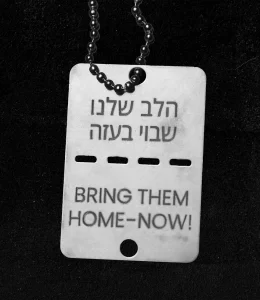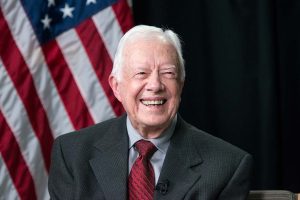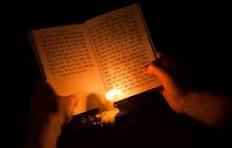We approach Shabbat with heavy hearts, mourning the loss of two young people, Sarah and Yaron.
Sophie Milman performs Eli, Eli, the poem of Hannah Senesh. May we find peace this Shabbat, for us and everyone.
Shabbat Shalom
#BringThemHomeNow
We approach Shabbat with heavy hearts, mourning the loss of two young people, Sarah and Yaron.
Sophie Milman performs Eli, Eli, the poem of Hannah Senesh. May we find peace this Shabbat, for us and everyone.
Shabbat Shalom
#BringThemHomeNow
We mourn the tragic deaths of Sarah Milgrim and Yaron Lischinsky
murdered outside last night’s AJC event.
The world mourns the passing of Pope Francis. He was an extraordinary and holy man. At the age of 88, it is difficult to consider his death untimely, yet indeed, it feels that way. His pursuit of love remains a lesson unfulfilled despite his tireless efforts to lead the world toward such a place.
Naomi and I had the privilege of an audience with the Pope while in Rome a few years back. The charismatic presence was matched only by the exuberance of a faithful crowd. The encounter was memorable and moving.
His work on behalf of the poor and the suffering in the pursuit of peace and love was incredible, a mixture of Herculean and Sisyphean. But as our sage, Rabbi Tarfon shares in Pirkei Avot, although we may never complete the task, we cannot desist from it. Pope Francis leaned into the daunting, hard work of bringing a voice to the voiceless and the best values of the Church as a beacon into the darkness.
May his soul be bound in everlasting life. May he rest in Peace.
And He lived…
Vayechi is a misnomer. The chapter that opens with And He Lived is actually the final moments of Jacob’s life. Jacob is on his deathbed, surrounded by his sons. He offers frank assessments of them and blessings of a kind as he prepares to die. Indeed, our tradition looks to this chapter as the essence of the Jewish Ethical Will. It is a centerpiece for me when teaching the Ethical Legacy Will. What we bequeath as our legacy is genuinely profound; what we offer as our final thoughts, spoken and unspoken, will resonate in the hearts and minds of those we leave behind, framing their understandings of their place in the world and how they forge relationships of their own. One of the most striking examples lies outside the text. Nowhere is Jacob’s daughter Dinah to be found.
We can surmise that Dinah’s relationship with her father, Jacob, was not close. In the story of her rape, she is identified as the daughter of Leah. We never hear her voice telling the story, and Jacob’s concern for his sons’ vengeance focuses on how it will complicate things with other clans. He seems unconcerned about whether she was harmed. It is disappointing that Dinah is not at her father’s bed to say goodbye. Every son was there, and even sons not held in particular esteem were present to at least hear their father’s final words.
What is said and what is unspoken, who is in the room, and who is excluded. We learn so much by being aware of these things. We hold an extraordinary power as parents. We are exemplars of behavior and also models of misconduct. Both have a profound impact. We need to exercise caution. For what we say and to whom will last far beyond our mortality.
Did Dinah grieve for Jacob? Did she feel excluded from the intimate space, witness to his passing? Did she harbor resentment about being treated so differently from her brothers? These are only some of the questions the text begs but leaves unanswered. Some may chalk this up to Jacob’s milieu and the age in which he lived. It is unfair to judge a character from the past by current acceptability standards, particularly one with such eminence in our grounding myths.
I am disappointed, however. Jacob’s life trajectory has been extraordinary. At the start, he is a stealthy, guileful, and conniving person who grows and evolves to become rightfully someone worthy of the title Patriarch. His encounters with the Angel at Beth El and his brother Esau exhibit his remarkable growth. His reunion with his son Joseph and his treatment of Manasseh and Ephriam show that he is loving and caring. So, the time here at his bed seems a bit off. I would have thought his compassion and empathy could have extended to all his family. I expected that his harsh words for Reuven, Shimon, and Levi would have been tempered by the knowledge they already knew the consequences of their actions, and leaving them instead with something positive to remember him would serve these sons better. And, of course, there is Dinah, or more precisely, there is not.
This was a final moment to offer some reconciliation. To offer her heartfelt words that might heal wounds that likely could not do so. Some Midrashim suggested that perhaps she was not even around, but she remained in Shechem. The rabbis struggled with her story, offering several alternative ideas about what became of her. There is so much we do not know, and it makes the heart ache to wonder about the pain of being excluded or without a voice.
What we leave behind endures—both the good and the bad. Our legacy is taught in our lives and the examples we set. The Ethical Will offers a chance to leave final words behind, maybe to explain poorly understood behavior, and indeed to provide enduring words of connection. What we say and to whom will be lasting. We need to exercise care for our own sake and on behalf of the hearts of others.
And he lived…
Rabbi Info:
Rabbi David Levin is dedicated to creating a meaningful life journey with Jewish wisdom. He teaches on these subjects, including the Ethical Legacy Will, and can be found at RabbiDavidLevin.com and EthicalLegacyWill.com.
 One of the horrors of the current war is the holding of the hostages. Their predicament is hopeless because their freedom depends on some level of trust, and there is no trust.
One of the horrors of the current war is the holding of the hostages. Their predicament is hopeless because their freedom depends on some level of trust, and there is no trust.
Israel and Hamas are avowed enemies. Each is dedicated to the destruction of the other. There is no middle ground, no reconciliation, no peace. With this at each core, trust cannot exist.
Hamas has fully embraced the “civilian as a weapon” idea. To give up the hostages means giving up one of its most potent weapons. The hostages have been used as shields, and many believed as a bargaining chip. But without trust, there is no incentive to use this bargaining chip, and once it is used, nothing is left. Hamas does not trust that Israel will live by an agreement; they believe Israel sees an agreement as only the means to obtaining the release of the hostages, nothing more. Once the hostages are returned, Israel will continue to prosecute the war.
Israel has displayed its commitment to destroying Hamas. As Hamas cannot be appeased, it must be eliminated. Israel has a long memory and believes in retribution. It does not trust Hamas. Israel thought it could permit Hamas to exist as it did not pose an existential threat and accepted a tenuous ceasefire. Then, October 7 happened, and whatever trust existed was shattered.
A ceasefire is a lull until it ends, and the warring begins again. This is part of the cynical lack of trust, but it is one of the few things both sides can agree upon.
War is usually fought to capitulation. One side is defeated unequivocally. The victor then dictates the terms of surrender and peace over the vanquished. This may not be possible. But until these two warring parties have more to gain by ceasing hostilities and learning to co-exist, the death and destruction will continue.
I pray that the current negotiations might prove me wrong and that the hostages will be returned. And perhaps peace might be seen as an alternative to hatred and carnage.

We should pause and reflect on Jimmy Carter and the gift that was his life.
President Jimmy Carter engineered the peace between Israel and Egypt, and we are indebted to him, if only for that.
He was an exemplar of morality, committed to peace and human rights, and striving to improve the world.
During the High Holidays, we reflect on the balance between Din and Rachamim, the strictness of law and compassion. Many have thought Carter was too compassionate and not strong enough. Nowadays, the world seems to be seeking “strongmen” as leaders. We lose something when our leaders cannot access humanity and compassion.
As President and throughout his life, Carter was a remarkable human being, a consequential force for positive change in our world.
May his name be for a blessing.
Here we are, Celebrating Simchat Torah and welcoming Shabbat, but even this moment of joy is a challenge. We pray for the hostages to be returned and for peace.
Peri Smilow shares Debbie Friedman’s Those Who Sow based in Psalm 126.
Shabbat Shalom
This Shabbat is different. The feelings of vulnerability evoked by Sukkot underscore October Rain. Shulem Lemmer shares his rendition here.
In these times, when we’re focused on not drowning in the hurricane of hatred and antisemitism, our personal feelings often take a backseat. Since that dreadful day in October, our hearts and minds have been solely focused on our land and people. From the moment I heard this song, I felt compelled to cover it, as it conveyed so much of what we’ve struggled to express in recent months. (continued below).
Shabbat Shalom
The original “October Rain” was deemed “too political” for the world stage, leading to the release of a more neutral version, “Hurricane.” I am sharing “October Rain” in its raw, authentic form to voice our nation’s true sentiments. May the floods dry up with the warm sunshine of Moshiach’s arrival!
Lyrics: Writers of the history Stand with me Look into my eyes and see People go away but never say goodbye Someone stole the moon tonight Took my light Everything is black and white Who’s the fool who told you boys don’t cry? Hours and hours and flowers Life is no game for the cowards Why does the time go wild Every day I’m losing my mind Holding on in this mysterious ride Dancing in the storm We got nothing to hide Take me home And leave the world behind And I promise you that never again I’m still wet from this October rain October rain Living in a fantasy Ecstasy Everything is meant to be We shall pass but love will never die Hours and hours and flowers Life is no game for the cowards Why does the time go wild Every day I’m losing my mind Holding on in this mysterious ride Dancing in the storm We got nothing to hide Take me home And leave the world behind And I promise you that never again I’m still wet from this October rain October rain October rain
לא צריך מילים גדולות רק תפילות אפילו כשקשה לראות תמיד אתה משאיר לי אור אחד קטן
October 7 marks the solemn first anniversary.
These are the individuals we have lost. If you are blessed not to need to attend Yizkor services for lost loved ones this year, show up to share a moment of remembrance for these souls.
https://www.timesofisrael.com/those-we-have-lost/
 On Monday evening, August 12, we begin the solemn remembrance of Tisha b’Av, the Ninth day of the Month of Av in the Jewish calendar.
On Monday evening, August 12, we begin the solemn remembrance of Tisha b’Av, the Ninth day of the Month of Av in the Jewish calendar.
This day marks the great disasters that have befallen the Jewish people: the destruction of the First and Second Temples and other catastrophes. It is a sad day, often a fast day, with prayers of lament, including chanting the Book of Lamentations known as Eicha.
As a people of history, we know persecution too well. AntiSemitism has become more out in the open and widespread. The current war has complicated our relationship with the world even further. There is even speculation that Iran will launch its reprisal attack on this date as a cruel, ironic twist to the ongoing hostilities.
It is a time to acknowledge and share in the sorrow and the martyrdom of so many of our brothers and sisters whose only crime was to be Jewish.
As we reflect on this somber moment, we also take heart in knowing that Am Yisrael Chai, The People of Israel, lives through it all.
You can listen to the chanting of Eicha with its haunting melody here:
https://www.youtube.com/watch?v=z8RBrOiCy40